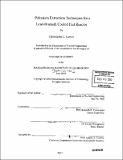Polonium extraction techniques for a lead-bismuth cooled fast reactor
Author(s)
Larson, Christopher L. (Christopher Lee), 1978-
DownloadFull printable version (18.40Mb)
Other Contributors
Massachusetts Institute of Technology. Dept. of Nuclear Engineering.
Advisor
Kenneth R. Czerwinski.
Terms of use
Metadata
Show full item recordAbstract
The construction of a next generation fast nuclear reactor using liquid lead-bismuth as a coolant demands the design of applied technology to remove 210Po from the neutron activated lead-bismuth eutectic. Experiments were performed to determine the kinetics of polonium hydride and lead-polonide released from molten lead-bismuth to determine the rate response of gaseous polonium chemical species in contact with various argon and hydrogen gas streams. It was determined that the rate release of polonium hydride is slightly higher at lower temperatures. The kinetic response is also faster with increased hydrogen content, as evident by the determined equilibrium constant. In addition, experiments involving the adsorption of gaseous polonium species on metallic praseodymium were undertaken. Formation of an oxidation layer and physical deterioration of the praseodymium inhibited proper sample analysis. The extraction techniques of rare-earth filtering and polonium hydride stripping and their relative figures of merit were discussed. Of the two techniques, a small-scale design adopting polonium hydride stripping was explored to address basic issues of design, fabrication, operation, and maintenance of an online polonium extraction system. Pending results of further investigation on alkaline extraction and electro-deposition experiments a small-scale design may be pursued.
Description
Thesis (S.M.)--Massachusetts Institute of Technology, Dept. of Nuclear Engineering, 2002. Includes bibliographical references (p. 92-94).
Date issued
2002Department
Massachusetts Institute of Technology. Department of Nuclear Engineering; Massachusetts Institute of Technology. Department of Nuclear Science and EngineeringPublisher
Massachusetts Institute of Technology
Keywords
Nuclear Engineering.